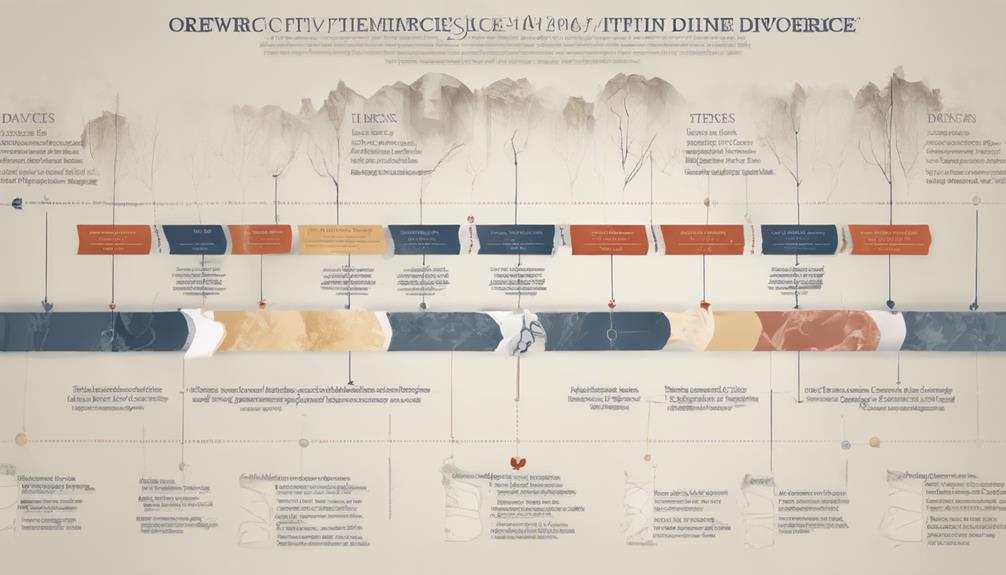Choosing between a contested and an uncontested divorce depends on your situation. If you and your spouse agree on most issues like property, custody, and support, an uncontested divorce is usually faster, less expensive, and less stressful. However, if there are deep disagreements or complicated assets, a contested divorce might be necessary to protect your rights. Understanding these differences can help you make a confident decision—continue to learn more about which option best fits your needs.
Key Takeaways
- Uncontested divorce involves mutual agreement, quick resolution, and less court involvement, suitable for amicable couples.
- Contested divorce is necessary when disagreements are deep or complex, often requiring court decisions and lengthy proceedings.
- Uncontested divorces are typically less expensive, less stressful, and can preserve a more amicable relationship.
- Contested divorces protect rights in complex asset or custody disputes but tend to be more costly and emotionally draining.
- Choosing between them depends on communication, willingness to compromise, and the complexity of issues involved.

When you’re facing divorce, understanding the difference between contested and uncontested cases can help you navigate the process more effectively. In an uncontested divorce, both you and your spouse agree on key issues like property division, child custody, and support arrangements. This often means fewer court appearances, less stress, and a quicker resolution. It’s a smoother path if you’re able to communicate openly and reach common ground without much dispute. On the other hand, a contested divorce occurs when you and your spouse can’t agree on these critical matters, forcing the court to step in and make decisions for you. This process can be lengthy, emotionally draining, and more expensive, as it involves negotiations, hearings, and possibly a trial.
One of the main differences lies in how property division is handled. In uncontested cases, you and your spouse typically work together or with the help of mediators to divide assets fairly, based on your state’s laws. This collaborative approach often results in a more equitable and less contentious property division. Conversely, contested divorces tend to involve disputes over who gets what, sometimes leading to complicated court battles. Property division can become a major point of contention, especially if there are significant assets, debts, or disagreements about the value of certain property.
Property division in uncontested divorces is collaborative, while contested cases often involve disputes and court battles.
Marital reconciliation is an important consideration in some situations. If there’s a chance you and your spouse might reconcile, pursuing an uncontested divorce could be a way to keep the door open. It’s less adversarial and allows you both to focus on resolving issues amicably, which could facilitate reconciliation later if circumstances change. However, if reconciliation isn’t possible or is unlikely, then proceeding with a contested divorce might be necessary to protect your interests and clearly define your rights.
Choosing between a contested and uncontested divorce depends on your unique circumstances. If you and your spouse can communicate effectively, prioritize cooperation, and are willing to compromise, an uncontested divorce may be the best route. It minimizes conflict and often results in a faster, less costly process. But if disagreements are deep and persistent, you might need to go through a contested divorce to ensure your rights are protected, especially regarding the division of property and other important issues. Ultimately, understanding these differences helps you make informed decisions, enabling you to navigate your divorce with clarity and confidence.
Frequently Asked Questions
How Long Does Each Divorce Process Typically Take?
The divorce timeline varies based on your situation, but generally, an uncontested divorce takes about 3 to 6 months, making it quicker and smoother. On the other hand, a contested divorce can extend from several months to over a year, depending on court schedules and disputes. The process duration depends on how complex the issues are, and whether both parties agree, impacting how long your divorce process will take.
What Are the Cost Differences Between Contested and Uncontested Divorce?
You might think all divorces cost the same, but they don’t. Uncontested divorces are usually cheaper because you save on legal fees and court costs by settling out of court. Contested divorces often involve higher expenses due to prolonged court battles, multiple hearings, and more legal work. So, if you’re aiming to minimize costs, an uncontested divorce generally offers a more affordable route.
Can a Contested Divorce Become Uncontested Later?
Yes, a contested divorce can become uncontested later if both parties reach an agreement through mediation potential or court intervention. You might start with disagreements, but with open communication and legal guidance, you can resolve issues outside of court. Once you agree on key points, your lawyer can help file the necessary paperwork, making your divorce uncontested and saving time and money.
How Does Each Option Impact Child Custody Arrangements?
Imagine custody negotiations as a game of poker—sometimes you reveal all, sometimes you bluff. With contested divorces, you might face bitter battles over parenting plans, causing delays and stress. Uncontested divorces, however, streamline custody arrangements, fostering cooperative parenting. Your choice impacts how smoothly you craft parenting plans, directly influencing your child’s stability. So, think about whether you’re ready to play hardball or prefer a more peaceful negotiation for your little one’s future.
What Are the Emotional Impacts of Contested Versus Uncontested Divorce?
You might find that uncontested divorce offers a smoother emotional healing process, reducing stress and protecting your mental health. In contrast, contested divorce often brings heightened emotional turmoil, prolonging mental strain and delaying your emotional recovery. Recognizing these impacts helps you prioritize your well-being, encouraging you to seek support and focus on mental health during this challenging time. Choosing an amicable path can foster better emotional outcomes for you and your family.
Conclusion
Choosing between a contested and uncontested divorce depends on your situation, but remember, it’s not worth beating a dead horse if you can settle things amicably. Uncontested divorces often save time, money, and stress, allowing you to move forward more smoothly. Ultimately, you want an outcome that works for you, so don’t be afraid to weigh your options carefully. After all, it’s better to light a candle than curse the dark.










